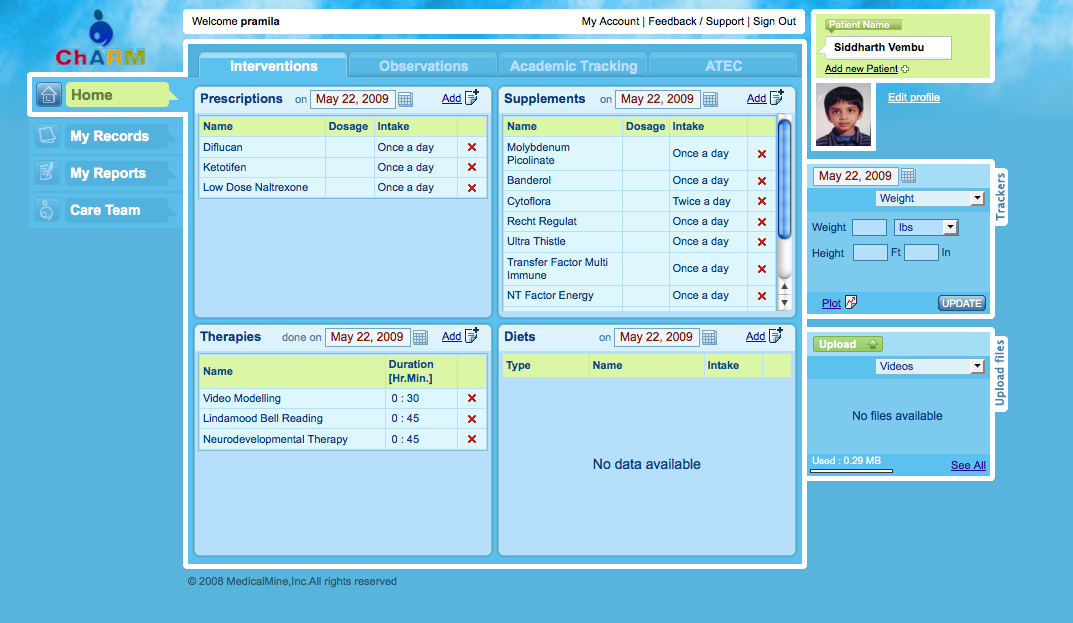A Real ROI from Twitter? The Start of Social Medical Networks

There may not be a big enough return on tweeting yet to report it to your CFO. But it won’t be long before there’s a clear, return on tweeting to report it to your doctor.
Let’s say your daughter is suffering from autism, as is Sophie Nelson, the daughter of Elizabeth Horn. She could be singing a rendition of her favorite pop song for a gathering of the Parent-Teachers Association at a local school – and start to slur her speech.
If you’re Elizabeth, you would pull out your smartphone and send a tweet to a database that is tracking Sophie’s condition, every day. You’d put a hash tag on it, such #AU-EL. “AU” for the autism database, “EL” for “Expressive Language.” You might follow it with a number, like “-3” to rate the performance. The sending of the tweet would put a time stamp on it.
Sound farfetched? It’s not.
On Sunday, the era of social networking gives rise to one of the first steps into an era of medical networking. Where families and friends who barely know each other come together to solve chronic conditions that befall loved ones.
At the Autism One Conference in Chicago, a Web-based program for collecting data on individual cases of the brain development disorder will be unveiled. It’s called ChARMTracker and is designed, at the start, to help ease the burdens of each parent trying to keep track of the drugs, nutritional supplements, physical therapies and dietary tacks being taken to treat their sons or daughters. They will also use it to keep track of any observations about their behaviors that might seem pertinent and how their children are performing academically, as a result of the constantly changing constellation of combinations that are being applied to the still-mystic condition.
ChARMTracker is the product of two software companies whose CEOs have either a son or a daughter afflicted by autism. Both are companies which provide software to consumer or commercial users as a service, from the Web. One is Zoho, which provides free word processing, spreadsheets, presentations, databases, note-taking,conferencing and other applications on the Web. The other is NetSuite, the provider of commercial-strength office applications, for accounting, resource planning, customer relationship and other corporate functions. One NetSuite founder is Larry Ellison.
But the pertinent players here are Sophie Nelson, the daughter of NetSuite chief executive Zach Nelson; and, Siddharth Vembu, the son of Zoho founder Sridhar Vembu. Both Sophie and Siddharth are autistic children.
Horn has, for instance, collected 60 two-inch thick binders of observations, medical and supplement records about Sophie, over the last 11 years. Those records would be available to Sophie’s doctors and health care aides, in an instant, if ChARMtracker had been around from the start. They would also be part of a growing mound of evidence on how drugs, supplements, therapies and diet affected autistic individuals, as they grew and evolved.
And that’s the key here. The kind of database of behaviors and treatments that can result from something like ChARMtracker, if it is easy to use and easy to input new information – like in tweets – could be profoundly useful. At the least, doctors treating autism or another chronic condition with a living database of hundreds or thousands or millions of contributors, would be able to make a more informed decision as to what the effect of a change in diet, prescription drug or other therapy will produce.
At best, there might even be advancement toward a cure. In the case of autism, Horn is hoping that the database might lead to the identification of “biomarkers,’’ which can identify with (hopefully) 100% accuracy in a blood test whether a child actually has autism. So treatment can begin even before symptoms start to emerge.
The development platform has been provided pro bono by Zoho and the Web-based software (which can be found at http://www.charmtracker.com) produced by Vembu’s wife, Pramila Srinivasan, a stay-at-home algorithm queen.
Here’s Sridhar’s official comment:
“Technology is a crucial piece to help us solve the puzzle of autism. Without a systematic ollection of data about these children, form genomics to nutrition to environmental triggers, we will not find the answere to the unanswered questions about causation and prevention.”
But what this really augurs is a whole new form of social networking, brought to bear against chronic conditions of all kinds. If this works, Pramila has founded another company, MedicalMine Inc., which will take what she has developed and try to extend the approach to other chronic physical conditions and forms of disease management.
If all goes well, parents and patients will not just be collecting and sharing data through sites like this on the Web. They’ll be communicating with doctors and providing real-time evidence of results, through tweets and other instant messaging technologies. In some cases, sensors will provide constant streams of data that will be put into the record and analyzed, for individuals and the group, as a whole.
These social medical networks could wind up being “the most fundamental IT app” that a family or its friends need, when desperately seeking answers about afflictions suffered by anyone they care about.
For that, every data element – and every tweet – will count.
And, over the long haul, produce a calculable return.
Tracking how ChARMTracker fares, in itself, will bear watching. In the last few days, the number of families participating in the Day One service – tracking autism – has doubled from 300 families to 600.
But the real tracking of the service, 18 months or more in the works, starts Sunday.
This is the kind of electronic health-record keeping that, if it works, should get the attention of the Obama Administration.
When he starts tweeting about it, you’ll know the approach is working.
Until then, it’s up to the participants to make something out of it. After all, like other Zoho apps, there is no barrier here. It’s free.
Happy Memorial Day weekend. If you're the parent of a child with a chronic condition, this could be the start of a form of social networking that makes a difference.
